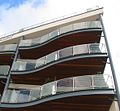Economic statistics

Hospitality (hotels, restaurants and bars) made up 4.2% of Jersey's GVA in 2019. [4] It is estimated that the wider contribution of tourism in particular is 8.3% (2017). [5] Tourism is important for Jersey's taxation, making £12.5 million in GST (15% of the total). However, total spend is much higher, around £250 million. This creates 6,470 jobs. [6]
In 2017, the total number of visits increased by 5% to 726,800, of which 580,000 were considered "Holiday visits". The total number of visitors has declined since 1997. In 1997, Jersey had 985,000 visitors. [7] Jersey tends to attract visitors from an older demographic than average, with the average age of UK leisure visitors being 57. [5]
Travel to Jersey is very seasonal. Accommodation occupancy is much higher in the summer months, especially August, than in the winter months (with a low in November). [5] The majority of visitors to the island arrive by air from the UK, however access is also possible by ferry. Air links to mainland Europe are not as good as those to the UK. There are calls from some, including St Helier Constable Simon Crowcroft, for the island to increase attractiveness to cruise liners, however this would require investment in a deep water berth, which the island currently lacks. [8] Air routes are subsidised by the States of Jersey. [9] Exact figures for subsidies are not in the public domain.




